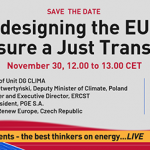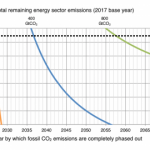We're breaking for summer! Energy Post thanks all of our readers and expert contributors for a great first half of the year. We’ll be back in September with our articles, as well as more events discussing the key challenges faced by this sector. Do get in touch if you have suggestions for particular event topics, can bring expert knowledge to our panels, or are interested in sponsoring. We thank you for avidly sharing our articles on social … [Read more...]
INTERVIEW: ANDREA STEGHER Vice President International Gas Union “We need every instrument at our disposal to fight climate change”
Energy Post's Matthew James talks to Andrea Stegher, Vice-President of the IGU about price caps, security of supply, CCUS, Markets and Renewable Gases ahead of our conference "The Future of Gas" tomorrow and Thursday online from 09:00 to 12:15 both days. You can REGISTER NOW. In the interview, Andrea talks about the importance of cooperation, innovation and above all a need to invest in all the instruments available to fight global warming - … [Read more...]
Event Summary: Building GW-scale Offshore Wind in the Baltic Sea
Here we provide a written summary of the panel discussion “Wind of Change or Change of Wind? The future of Baltic Sea offshore investments” held on 12th September 2022 in Brussels. It’s a full summary of the 90 minute discussion (including audience questions), but it begins conveniently with a summary of the highlights. The Baltic Sea has the potential to develop over 90 GW of offshore wind capacity. The Russian invasion of Ukraine has delivered … [Read more...]
The greenest energy is the energy we don’t use
As COP26 comes to a close, Martin Rossen, Senior Vice President, Head of Group Communication and Sustainability at Danfoss reminds us in a powerfully persuasive way why the most direct route to net-zero is managing consumption. Inspired by a glaring omission by Bill Gates in his recent book, Rossen draws our attention to the futility of developing new tech if we don’t prioritise making use of readily available energy efficiency solutions. … [Read more...]
Re-designing the EU ETS to ensure a Just Transition [VIDEO]
On November 30th, 2020, we ran a live online panel discussion concerning the re-design of the EU ETS in the wake of new, higher CO2 reduction targets being agreed by the EU. The target now stands at a 55% reduction c/w 1990 levels by 2030, up from 40%. A huge jump in order to keep in line with Paris commitments. The session was moderated by Matthew James, Managing Director at Energy Post and featured interventions from Andrei Marcu (Chairman at … [Read more...]
Overbuild solar: it’s getting so cheap curtailment won’t matter
Avoiding curtailment made sense when solar generation was extremely expensive: don’t build solar beyond what you can store. However, that means solar must always wait for storage costs to decline and capacity grow. But with solar prices plummeting it can make economic sense to overbuild it, say Richard Perez, University at Albany, and Karl Rabago, Pace University. Oversized solar will deliver more energy in low light and reduce the need for … [Read more...]
UK’s net-zero ambition: counting all emissions, not just in-country
The UK’s Committee on Climate Change (CCC) has advised its government to go zero-carbon by 2050. But, say Joe Blakey and Marc Hudson of the University of Manchester, counting all emissions means counting the carbon footprint of imports too. Including these (and excluding emissions from exports) the UK’s footprint is 70% higher than the figure used by the CCC. The same is likely true for all high income economies. And the cost of successful … [Read more...]
EXCLUSIVE INTERVIEW – GCCA’s Claude Lorea: “How can we provide the world with the concrete it needs in a sustainable way?”
Concrete is, after water, the most consumed resource on the planet and no other man-made material is more widely used. Without it, there are no buildings, bridges, dams or roads – no Sydney Opera House, no Hoover Dam or Golden Gate Bridge, no Pantheon in Rome. It is no surprise, then, that it has significant environmental impacts. More than 4bn tonnes of cement, the main ingredient of concrete, are produced every year leading to between 5 and 8% … [Read more...]
Green New Deal can learn from Obama’s $90bn clean energy plan of 2009
The “Green New Deal” proposal is a 10-year plan to curb climate change by shifting the U.S. economy away from fossil fuels. Will it work? Yes (with caveats) if it’s anything like President Obama’s 2009 American Recovery and Reinvestment Act: it invested $90bn to promote clean energy as part of an economic stimulus plan to recover from the bank crash. That's the view of Joseph Aldy, Associate Professor of Public Policy at Harvard Kennedy School, … [Read more...]
UK nuclear plans are in tatters. But current incentives help gas, not wind and solar, step into the gap
The scrapping of plans for a new nuclear power station in Cumbria and the suspension of work on another in Anglesey have put the brakes on the UK’s nuclear future. But the government appears more keen to fill the gap with gas rather than renewables. David Toke of Aderdeen University criticises the current incentives and regulations and makes the case for wind and solar. … [Read more...]
How much subsidy does solar need, and for how long?
Schalk Cloete presents his latest paper looking at what affects the profitability of an investment in a power sector. After reviewing onshore wind and nuclear, he now looks at solar. His analysis of coal and gas are to come. Intermittency, market share, maintenance, integration costs and other factors are modelled in detail to help predict solar’s future. *This article is brought to you via our new author platform. If you have an article you … [Read more...]
A grassroots fightback against Trump and U.S. Oil & Gas is underway
As the 116th Congress commences, in the wake of dire reports from climate scientists, the debate over U.S. climate policies has taken a welcome turn towards bold solutions. Capitol Hill is alive once again with policy proposals that edge towards the scale required to address the crisis we’re in. A new study by Kelly Trout of Oil Change International, along with 17 partner organisations, makes it clear that managing a rapid and equitable decline … [Read more...]
“Consuming less energy may act as disincentive for investment in renewables”
According to Anthony Patt, Professor of Climate Policy at the ETH Zürich in Switzerland, the less we spend on energy, the less attractive renewables can look to businesses and investment markets. Such remarkable insights fly in the face of received wisdom and defy logic. Patt claims his models show that doubling current energy efficiency improvement rates buys us only one extra year to hit the Paris targets. Really? - This is how Anthony … [Read more...]
Electric metering should break its link with power consumed and create it directly with the costs of delivery
In a world where electricity is generated from non-renewables (oil, gas, nuclear) our meters measure and charge us for electricity delivered, as if it was a fuel being consumed. Going forward, the cost should be measured against what is actually being consumed. In a renewables world – particularly 'run-of-the-river' hydro, wind and solar - that’s not the electricity. It’s the wear and tear on the infrastructure. Treating these types of renewable … [Read more...]
Energy Efficiency targets: Time to ramp up investment in buildings, industry and vehicles
Energy efficiency investment rates need to double now, and then double again in 2025, to meet energy efficiency’s obligation to hitting the Paris targets. Right now there is a €130bn annual energy efficiency investment gap in Europe. Peter Sweatman, Rapporteur for EEFIG, looks at the assets themselves and says we need to productise the measurement of their energy efficiency, and then legislate. That’s how to make energy efficient homes, offices, … [Read more...]
















